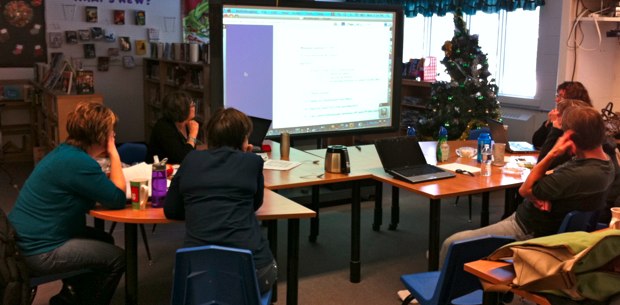The PLP stories are many and varied. You can find some of them here on this blog, on the Facebook page, on various wikis and inside the cohorts NINGs. Lots of great sharing and insights and conversations. Each cohort is made up of 20 or so teams of 5 or 6. The great thing about PLP is that it encourages a mix of online and offline, large and small, global and local interactions.
I had the privilege of sitting in on one of the team meetings in my local school division. After experiencing PLP from a leadership perspective over the past 2 years I was thrilled to be able to have some of the teachers and administrators that I work with every day to participate in PLP. With these folks, I’ve not done much more than observe as I wanted to see first hand how a team works and interacts. As a school division that has toyed with the concept of Professional Learning Communities but never really seen them take off, I knew the PLP offered a real shot at making this a reality. I’ve not been disappointed.
The Prairie Land Peeps team consists of 2 principals, 1 elementary teacher, 2 high school teachers and one online teachers. There experience ranges from only 2 years of teaching to near 30. They are from 5 different schools. Some of them met for the first time this year. They live as far as 2 hours apart and so during their winter vacation, they met face to face for an afternoon of discussion and planning in relation to an upcoming action research project. Trying to find a common thread or focus for such a diverse group can be challenging. What continued to strike me was the focus each one had on their students and learning.
Roger is an online teacher and an expectational one at that. He’s been teaching online for years with great success. My own son took calculus from him a few years back so I can attest first hand to his ability. Roger’s described a problem that he has right now as he teaches a class face to face, an admittedly easier Math class than what he teaches online. Yet his students are doing worse in the face to face class, some of whom also take the online class. He’s perplexed by this and wants to get to find out why. He has some inclinations but wants to involve his students in exploring this issue and work to make learning better, particularly for the class he teaches face to face. Shelley has a passion for social justice. She’s been chronicling her journey on her blog, which is a must read. Shelley wants her students to become more compassionate, globally minded and use technology to facilitate this. Lana is a principal in rural Saskatchewan and also teaches a course called Life Transitions. She knows that life long learning is mostly a phrase that’s tossed around but hasn’t really been explicitly addressed. She also knows that most of her students have little skill when it comes to using technology for learning. They know how to entertain themselves but she wants them to know how to use it to learn. Patti, the team leader played her role well in encouraging, listening, asking questions and trying to learn from everyone.
As each of the 6 team members shared, the focus on technology was in realizing its role in making these goals or ideas come to fruition. But the conversation was about learning and students. The fact that they took time out of their vacation, would spend over 4 hours in a vehicle driving on Saskatchewan winter roads would be enough to know they are passionate about teaching. But the depth of the conversation, the struggles each of them expressed confirmed that. There were many questions and ideas tossed about that have no simple answers. At times there was silence as they realized how complex things were. At the core, they see that technology, while offering some wonderful opportunities, makes school and learning a lot messier than it ever has been. As I sat and listened, I tried to offer some ways in which they might move forward but knew they would have to have full ownership in whatever direction they chose. There was certainly a sense of pride I felt about the efforts of these teachers. Yes, they are caring and compassionate people who want what’s best for kids. The difference between them and many of the other caring and compassionate people is that they acknowledge the need to work together, learn from and with local teachers as well as expand their worlds to become connected teachers. I wish that for all teachers.
Dean Shareski
Latest posts by Dean Shareski (see all)
- Hafa Adai! A Wonderful Journey With Wonderful Educators - May 30, 2020
- What’s Happening in Guam? An Educator’s Story - April 15, 2020
- Do We Need Coaches or Mentors? Both? - July 8, 2011



Thanks, Dean, for the post. I’ve not told you how pleased I am to be part of this learning opportunity. It is exciting to be learning from Will and Sheryl – the elluminate sessions, Literacy Network, building our own PLN’s, and the TPack model – it has inspired me to help facilitate 21st Centuryizing our teaching in the division. This was exactly what I needed for PD.